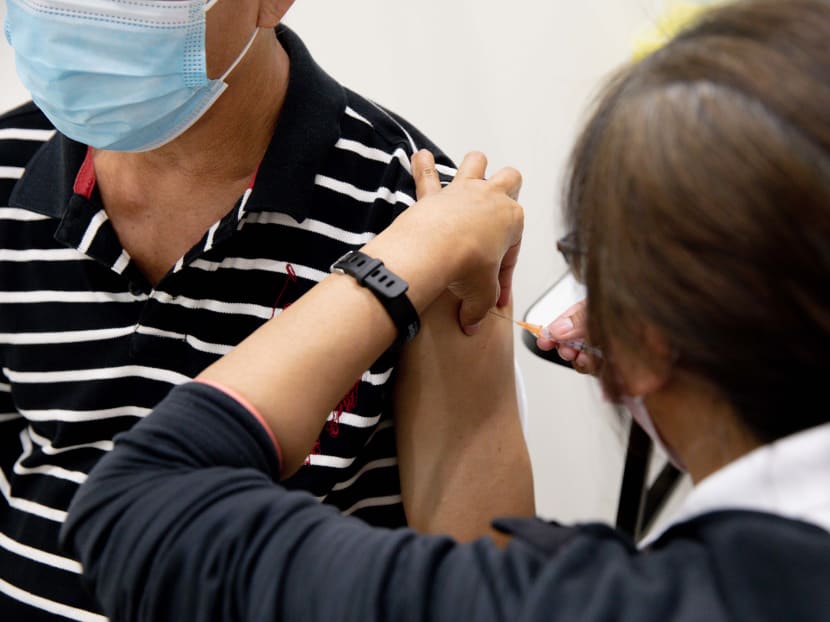‘Pfizer vaccine is safe, effective for those aged 12 to 15’: Covid-19 expert committee addresses concerns of some Singapore doctors
SINGAPORE — The Pfizer-BioNTech Covid-19 vaccine is safe and effective for children aged 12 to 15, Singapore’s expert committee on coronavirus vaccination has stressed, as it addressed concerns raised in an open letter to parents penned by a dozen doctors.
- Singapore’s expert committee on vaccines said again that the Pfizer-BioNTech vaccine is safe for children
- This comes after doctors here raised concerns in an open letter
- The committee clarified some of these concerns in a statement
- It said the Pfizer-BioNTech vaccine is the only one approved for children so far
SINGAPORE — The Pfizer-BioNTech Covid-19 vaccine is safe and effective for children aged 12 to 15, Singapore’s expert committee on coronavirus vaccination has stressed, as it addressed concerns raised in an open letter to parents penned by a dozen doctors.
The Pfizer-BioNTech vaccine, one of the two Covid-19 vaccines approved for use here, was earlier this week approved by the Health Sciences Authority to be safe for use for those between the ages of 12 and 15.
The letter from the doctors, dated May 20 and addressed to parents who are deciding whether to vaccinate their children, contained a list of what the doctors thought parents should be thinking through carefully before choosing to inoculate their children against Covid-19.
In a statement on Friday (May 21), the expert committee responded to that letter and laid out its reasons for deeming the vaccine to be safe and efficacious for this age group.
It clarified that the vaccine, which makes use of messenger ribonucleic acid technology (mRNA), cannot alter a person’s DNA.
This comes after the doctors’ letter cited a study suggesting that the RNA from Sars-Cov-2 — the coronavirus that causes Covid-19 — can be converted into DNA using an enzyme called reverse transcriptase, which the doctors said is “very troubling”.
In its statement, the committee said that the Pfizer-BioNTech vaccine comprises mRNA that contains the "instructions" to enable the vaccine recipient to build a protein component of the Sars-Cov-2 virus — also known as the spike protein.
“The spike protein does not cause infection, but is recognised by the body’s immune system as foreign. The body then mounts an immune response and produces antibodies that protects against future infection by virus,” the committee said.
The vaccine mRNA is broken down by the body rapidly after the spike protein is built. It is unable to produce more copies of itself and cannot enter the nucleus of the human cell where human genetic material, or DNA, is stored.
“Since the human genome is made up of DNA, it is not biologically plausible for the vaccine mRNA to be integrated or to interfere with the DNA of the vaccine recipient,” the committee stressed.
The doctors’ letter had also called for a "killed-virus vaccine", also known as an inactivated vaccine, to be approved for use here.
Unlike the newer mRNA technology, this approach uses a weakened or inactivated virus in the vaccine that is modified so that it no longer causes illness.
It is the approach used for existing vaccines used for the common flu, hepatitis A, chickenpox and others.
Responding to this, Associate Professor Benjamin Ong, who is the chairman of the expert committee, said that there is no inactivated Covid-19 vaccine approved for use in children yet.
The committee also pointed out that the Pfizer-BioNTech vaccine is the only Covid-19 vaccine now that is authorised for teenagers aged 12 to 15 worldwide.
It added that there is as yet “no credible evidence of an inactivated-virus vaccine demonstrating a high vaccine efficacy and safety profile among this age group”.
The 14-member expert committee was announced in October last year. Apart from Assoc Prof Ong, who is the senior adviser to the director of medical services at the Ministry of Health and the senior vice-president of health education and resources at the National University of Singapore, the committee includes other experts in infectious diseases, immunology and other relevant fields.
DOCTORS WITHDRAW STATEMENTS
In its statement on Friday, the committee said that 11 out of 12 of the doctors who signed the letter have since retracted it.
The original letter mentioned the following doctors along with their medical licence numbers: Dr Benny KH Tan, Dr Chia AM, Dr Clement Lai, Dr Colleen Thomas, Dr CT Tan, Dr Diane Jek, Dr Judy Chen, Dr Kee Leng Chee, Dr Kho Kwang Po, Dr Khoo Boo Kian, Dr Paul IW Yang and Dr Suzie Lee.
When contacted by TODAY, Dr Chen from Pariqua Clinic confirmed the open letter’s veracity.
In a second letter circulating on messaging platforms, the doctors said that they would like to “withdraw all our humble ponderings as some of our thoughts may be misunderstood by some laypersons”.
“We will henceforth ponder in a more professional and private forum,” they said.
Dr Khoo is the only doctor who did not sign the letter of retraction.
The expert committee said that the Singapore population, including adolescents, continue to “remain at risk of Covid-19 infection and onward transmission to their close contacts”, citing the example of the recent cases involving school-going children.
“While the international experience is that Covid-19 appears milder in the younger age groups, there remains a risk of complications and long-lasting symptoms in children and adolescents.
“The expert committee therefore recommends that with the availability of a safe and efficacious vaccine, all eligible persons should receive the vaccine to attain as high a population coverage of Covid-19 vaccination as possible,” it said.









